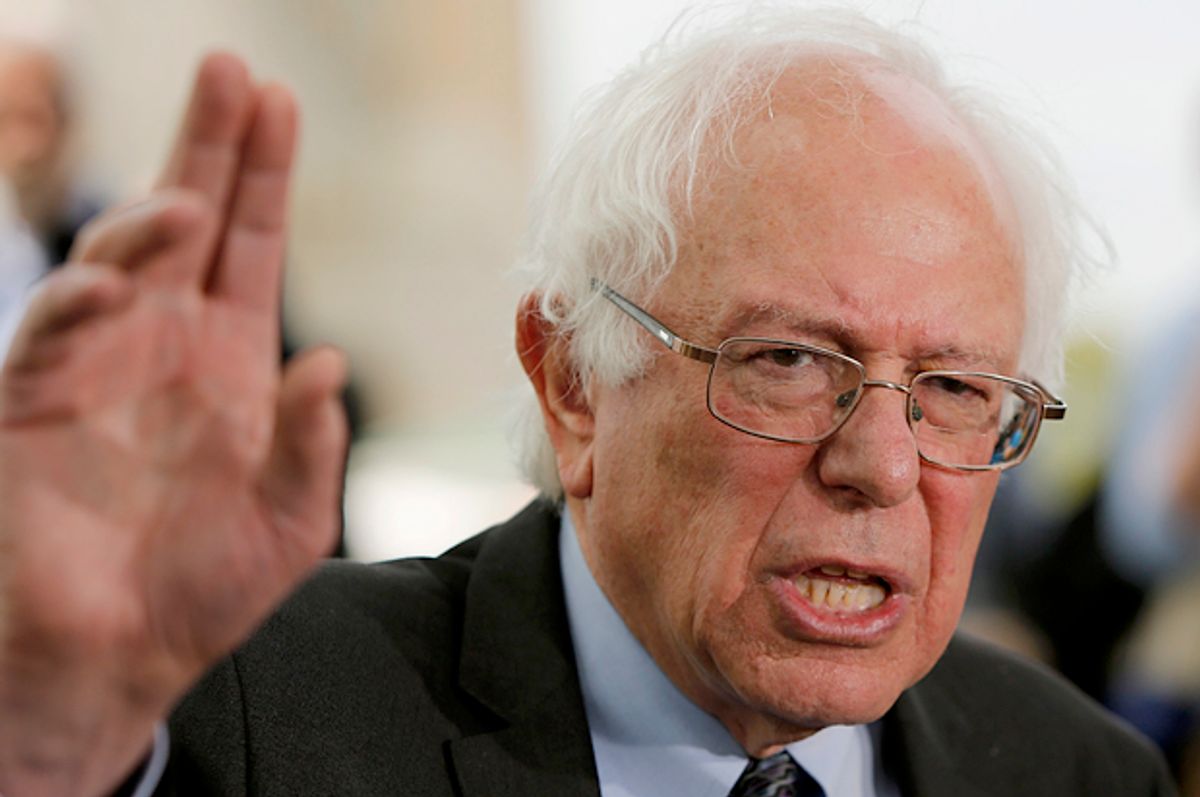Everything about Bernie Sanders’ remarks on his 2016 presidential candidacy was delightful. Ordinarily, a White House candidate’s big debut is marked by a grand, inspirational speech (Barack Obama, Marco Rubio); a slickly produced video (Hillary Clinton, Hillary Clinton); or a weeklong series of bumbling gaffes (Rand Paul). But Vermont’s independent democratic socialist senator paid no homage to any of the predictable and tiresome presidential campaign pageantry. Instead, Sanders held a small press conference outside the Capitol.
Candidates who embark on this huge endeavor typically kick things off in front of a throng of wild-eyed supporters, and they’ll linger on the moment and soak it all in before plunging into the frenetic life of a White House contender. Sanders’ audience was mainly reporters, and he told them he’d be making a statement and taking a couple of questions, but “we don’t have an endless amount of time, I’ve got to get back.” White House aspirants usually take time to thank their families, but Sanders didn’t mention his family or his background until a reporter asked about his brother Larry, who is running for the U.K. Parliament. At no point in his remarks about his presidential campaign did he explicitly say that he is running for president.
His unruly white hair twitching in the breeze, Sanders launched into a five-minute speech laying out in Brooklynese-inflected talking points the animating principles of his campaign: income inequality, campaign finance reform, climate change, green energy, jobs, and education. Foreign policy was mentioned in passing, but the Koch brothers came up several times. He capped his remarks with a pledge to never run a negative ad and an exhortation to the media to not treat the campaign like a “soap opera.” It was utilitarian and efficient. After he’d taken his last question, Sanders stalked off to a smattering of applause so he could go be a senator again. The whole thing took about 10 minutes.
And thus began Bernie 2016.
How will Sanders fare in the race? It’s impossible to predict with certainty, but the strong consensus is that he doesn’t stand a chance. At the moment, he’s actually drawing about five percent support among Democratic voters – more than Martin O’Malley, and within striking distance of Joe Biden. Those are presentable numbers, and it puts him about on par with Chris Christie on the Republican side, whom people still talk about as a serious contender. The issue confronting Sanders, of course, is that his five percent stands against Hillary Clinton’s 60-percent share of the Democratic electorate. That’s a huge gap to close, and Sanders is proposing to do it while handicapping himself tremendously.
Of all the issues that get Sanders riled up, money in politics is one of the big ones. And his campaign is going to serve as an example for how to run for national office without having a rich person bankrolling your efforts. “I am not going to start a super PAC,” Sanders told reporters. “I’m not going to go around the country talking to millionaires.” All the money for Bernie 2016 will be collected in small donations from people who can’t afford to buy a candidate.
You have to admire him for standing on principle. What that means, though, is that he’ll be fighting with both arms and one leg tied behind his back. Ask Hillary Clinton and she’ll also say she supports getting “hidden money” out of politics, but she’s also going to take full advantage of the existing system, and squeeze every dollar she can out of every rich person within her immediate vicinity. He’ll be outspent, and not by a small margin.
Sanders, of course, knows this. He described his “hesitancies” about entering the race yesterday, and the chief one was money. And while Sanders insists that he’s in the race to win, he also talks about his campaign as if he’s out there to make a point. “I wonder now, in this day and age, whether it is possible for any candidate who is not a billionaire, or who is not beholden to the billionaire class, to be able to run successful campaigns,” Sanders said. “And if that is the case, I want you all to recognize what a sad state of affairs that is for American democracy.”
But there’s value and influence in being the candidate who makes a point. Sanders is a passionate advocate for labor and the working class, and a vocal critic of Wall Street. He’s in favor of expanding Social Security benefits and breaking up the biggest banks, and he’s already shown he can draw decent crowds in Iowa, where he's now polling second at a respectable 14 percent (again, he's well behind Clinton, who takes 62 percent). His campaign is going to be populist and policy-driven, and while he might not have enough space to outflank Hillary on the left, he can still keep her honest. “His chance of winning would be infinitesimal,” the New Yorker’s Ryan Lizza wrote of Sanders back in November, “but his presence in the race and his passion about a few key issues would expose vulnerabilities in the front-runner’s record and policies.”
Regardless of how he fares, the 2016 race is already more interesting with Bernie Sanders in it.

Shares